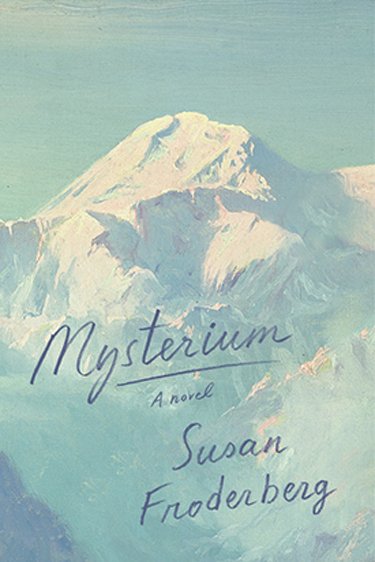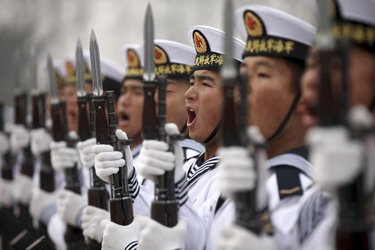Archive for August, 2018
31 Aug 2018


Meghan Daum (Vassar, Columbia) describes her breaking up with her husband and with the world-view of the urban community of fashion and her new romance with the “intellectual dark web.”
The night of the election, I sat on the sofa watching CNN and exchanging texts with my husband. The first text, from me to him, said something like, “Relax, it’s still early.†The last, hours later and from him to me, was one word: “Wow.â€
I hardly need to describe what happened over the next year. Racists became more racist. Sexists hardened into full-blown misogynists. In turn, those fighting their bigotry too often instituted their own kind of tyranny. Almost immediately, the resistance became not just a front line against Trumpism but its own scorching battleground. To be frothing with rage over one thing meant being insufficiently aggrieved over something else. If you were worried about women, you weren’t worried enough about blacks. If you marched for immigrants, why didn’t you show up for the scientists? For many, there was no amount of outrage that couldn’t be outdone, no wokeness woke enough.
Amid this crisis, virtue signaling went from a kind of youthful fashion statement to the default mode of public and private expression. Twitter headlines wrapped themselves in the banner of social justice even if there was hardly a social justice angle at all. New crops of young journalists, many consigned to online opinion writing, knew all too well that career advancement depended on clicks, which in turn depended on fealty to the woke narrative. From NPR to CNN to dinner parties in gentrified Brooklyn, you’d think the only allowable conversations were the ones in which facts were massaged to accommodate visceral feelings of leftist outrage. Sipping my rosé in the parlors of Cobble Hill brownstones, I’d hold my tongue as the permissible opinions ricocheted like bullets off the 11-foot ceilings. Of course evolutionary psychology is bullshit. Of course the conservative columnists in the New York Times are nothing but privileged, retrograde troglodytes who bring nothing to the table whatsoever. David Brooks should fucking retire already! Amazing cheese, by the way. Zimbro?
Julius Evola will be so pleased to have her on board. A must-read.
31 Aug 2018


Raymond Chandler and Ian Fleming
Writers Ian Fleming and Raymond Chandler oddly enough actually formed a friendship in the 1950s. After Chandler’s death in 1959, Fleming wrote a long piece about his friend in the December 1959 issue of the London Magazine, which they’ve thoughtfully reprinted.
I first met Raymond Chandler at a dinner party given by Stephen and Natasha Spender some time in May 1955. He was just coming out of the long spell of drinking which followed the death of his wife. She died after a three years’ illness in their house at La Jolla, in California. When the police arrived they found Raymond Chandler in the sitting room firing his revolver through the ceiling. Chandler never recovered from the tragedy and, whatever the reality of his married life, his wife became a myth which completely obsessed the following years.
He sold his house in California and every scrap of furniture that reminded him of her and came to England, perhaps in one of those flights back to one’s youth and childhood (he was educated at Dulwich and worked for some time in London) that badly hurt people sometimes resort to.
He was very nice to me and said that he had liked my first book, Casino Royale, but he really didn’t want me to talk about anything much except the loss of his wife, about which he expressed himself with a nakedness that embarrassed me while endearing him to me. He showed me a photograph of her – a good-looking woman sitting in the sun somewhere. The only other snapshot in his note case was of a cat which he had adored. The cat had died within weeks of his wife’s death and this had been a final blow.
He must have been a very good-looking man but the good, square face was puffy and unkempt with drink. In talking, he never ceased making ugly, Hapsburg lip grimaces while his head stretched away from you looking along his right or left shoulder as if you had bad breath. When he did look at you he saw everything and remembered days later to criticize the tie or the shirt you had been wearing. Everything he said had authority and a strongly individual slant based on what one might describe as a Socialistic humanitarian view of the world. We took to each other and I said that I would send him a copy of my latest book and that we must meet again.
RTWT
30 Aug 2018


I’m almost never a fan of the government regulating what private companies can do, short of actual crime. However, what choice would there be if, for instance, the phone company possessing a de facto monopoly decided to block calls made by Republicans?
We have already extensive public accommodation law precedents, and the giant left-coast social media and search engines are currently getting away with unconscionable bias toward certain customers.
Zero Hedge agrees with Trump that these companies are treading on dangerous ground.
On Tuesday morning, President Trump lashed out at Google, with his remarks later broadening to include Twitter and Facebook, accusing it of “rigging” search results by presenting only results “from National Left-Wing Media” and accused “Google & others are suppressing voices of Conservatives and hiding information and news that is good.”
Those companies “better be careful because you can’t do that to people,” Trump said later in the Oval Office. “I think that Google, and Twitter and Facebook, they are really treading on very, very troubled territory and they have to be careful. It is not fair to large portions of the population.â€
Google immediately responded, condemning Trump’s charge, and claiming that “Search is not used to set a political agenda and we don’t bias our results toward any political ideology.”
And yet, as so often happens, in Trump’s crude delivery, the politically incorrect truth was once again found.
According to a memo posted on Facebook’s internal message board titled “We Have a Problem With Political Diversity”, and which was published by the New York Times, senior Facebook engineer Brian Amerige confirmed Trump’s allegation writing that “we are a political monoculture that’s intolerant of different views” and shockingly admitted that “we claim to welcome all perspectives, but are quick to attack — often in mobs — anyone who presents a view that appears to be in opposition to left-leaning ideology. We throw labels that end in *obe and *ist at each other, attacking each other’s character rather than their ideas.”
The scathing indictment of Facebook’s liberal “mono-culture” continues:
We do this so consistently that employees are afraid to say anything when they disagree with what’s around them politically.​ HR has told me that this is not a rare concern, and I’ve personally gotten over a hundred messages to that effect. Your colleagues are afraid because they know that they — not their ideas — will be attacked. They know that all the talk of “openness to different perspectives†does not apply to causes of “social justice,†immigration, “diversityâ€, and “equality.†On this issues, you can either keep quiet or sacrifice your reputation and career.
“These are not fears without cause” Amerige writes, and continues the stunning disclosure of the company’s biased culture, “Because we tear down posters welcoming Trump supporters. We regularly propose removing Thiel from our board because he supported Trump. We’re quick to suggest firing people who turn out to be misunderstood, and even quicker to conclude our colleagues are bigots. We have made “All Lives Matter†a fireable offense. We put Palmer Luckey through a witch hunt because he paid for anti-Hillary ads. We write each other ad-hoc feedback in the PSC tool for having “offensive†ideas. We ask HR to investigate those who dare to criticize Islam’s human rights record for creating a “non inclusive environment.†And they called me a transphobe when I called out our corporate art for being politically radical.
RTWT
29 Aug 2018


It’s easy to sell me $1.99, even $2.99, eBooks for my Kindle reader, but I generally avoid newly issued titles costing $13.99. Susan Froderberg’s essay on how she came to write her new mountain-climbing novel Mysterium has a lot of the same kind of over-the-top enthusiasm I like about the writing of my friend Steve Bodio. And she sold me. I’m buying both of her books.
In 2008, one of the climbing heroes I had read and heard tales about, John Roskelley, led the way for a group of us to the 17,000 foot base camp of Gangkhar Puensum, in Bhutan, the highest unclimbed mountain in the world. In 1978, Roskelley was one of the first Americans to summit K2. An American expedition team had first made an attempt in 1938, but it wasn’t until 1954 that the Italians would be the first to arrive to its summit. I still have the 1979 National Geographic Magazine with Roskelley’s K2 photograph on the cover: Rick Ridgeway looking like the tin man shackled in a high altitude suit with face covered by a silver mask, walking a knife-edge snow crest. (And looking relaxed!) Every time I gaze at this picture it blows me away.
For three weeks I followed behind Roskelley on the Bhutan trek, and when I wasn’t thinking through this or that notion or ambition or life complication, or simply letting my mind wander not pondering at all (what is walking for, after all?), I was listening to his stories. I still recall details of a few that will forever stick in my mind, even when I reach the age of not being able to recall my children’s names (or remember that I don’t have any). For example, he did not change his clothes at all (at all!) on one two-month-long expedition, day or night, for the sake of carrying less weight, and when he got off the mountain and finally had a chance to bathe he discovered the fabric of his clothing had embedded into his flesh and could not be washed away. Another time, he and a friend showed up to the base of a mountain in the Canadian Rockies they had hoped to ice climb the next day, and found the floor of the women’s restroom in a park campground a suitable enough place to bivouac for the night in below zero cold. (The men’s room was, evidently, unacceptable.) Roskelley was full of anecdotes like these, but he was reticent about incidents having to do with the Nanda Devi expedition. His hesitancy to speak about the Unsoelds or what happened on that trip fascinated me all the more. He had written a book and published an account of the team’s ascent (he and Lou Reichardt made the summit) and maybe there he had said all he wanted or needed to say.
Willi Unsoeld was one of the first Americans to summit Mount Everest on an expedition in 1963. He and Tom Hornbein traversed the west ridge—a legendary climb that has not since been accomplished. (Ueli Steck, the famed Swiss climber, plunged 3,200 feet to his death in 2017 on an acclimatizing climb for an attempt on the Unsoeld/Hornbein west ridge route.) Unsoeld taught philosophy and theology at Evergreen College. He died at the age of 52, two years after the death of his daughter on the Nanda Devi expedition, as he was guiding a group of his students on a summit climb of Mount Rainier. He and a student, a young woman who would have been about his daughter Devi’s age when she died, were killed in an avalanche on the descent.
Unsoeld named his daughter Nanda Devi after what was once the highest peak in India (it is now the second highest peak: in 1975 Sikkim joined the republic of India). “I dreamed of having a daughter to name after the peak,†he said. He did, and she grew up wanting to summit the mountain for which she had been christened.
It was the irony of the naming that compelled me to write the story. How would a father manage such a tragedy? A philosophy professor. What did he feel? How did he think? How did he carry on?
What would it be like to be him?
What would it be like to be Devi? To follow an ambition given to her by the name she had been named? To climb with her father, one of the most highly regarded climbers in American history? To meet and fall in love with a fellow team member on the trip and halfway up the mountain be engaged to be married to him? To be young and in love and at the top of the world with all of everything ahead of you? I don’t know, I can only imagine. No one can know. She is not here to tell us. I realized I would have to write the book I had been hoping to read.
29 Aug 2018


Contemporary education aka brain-washing is something. Kiddies at a Middle School in Cuyahoga Falls, Ohio were asked by a so-far-unidentified teacher in a so-far-unidentified subject to choose eight our of twelve people to save from the destruction of the planet on the basis their victim group privilege.
Bizpacreview:
An Ohio middle school is under fire after an assignment asked students to decide based on gender, sex and other factors who to save if the world was ending.
Students at Roberts Middle School in Cuyahoga Falls were asked to make the decision in the “Whom to Leave Behind†assignment, according to the Cleveland Plain-Dealer.
The not-yet identified teacher asked students to choose eight of 12 people to put on a space ship to take to a different planet if the Earth was about to be destroyed.
Some of the choices included in the controversial assignment, which parents slammed as “insensitive,†included a “militant African-American medical student,†a “homosexual, male professional athlete†and a “female movie star who was recently the victim of sexual assault.
RTWT
28 Aug 2018


Free Beacon:
NRA spokesman Dana Loesch’s husband reported a tweet by a man saying their children needed to be murdered, assuming the site would enforce its rules against such threats.
He was wrong. After Twitter user Milan Legius criticized Loesch on Sunday for her pro-Second Amendment views and said the murder of her children “needs to happen,” Twitter responded to her husband’s report by absolving Legius of wrongdoing.
“We have reviewed your report carefully and found that there was no violation of the Twitter Rules against abusive behavior,” Twitter wrote in an email to Chris Loesch.
Legius’ now-deleted tweet reads in full: “The only way these people learn is if it affects them directly. So if Dana Loesch has to have her children murdered before she’ll understand, I guess that’s what needs to happen.”
Twitter’s rules state: “You may not make specific threats of violence or wish for the serious physical harm, death, or disease of an individual or group of people.”
Twitter CEO Jack Dorsey said earlier this month that the platform was planning to crack down on “hate speech” due to employees’ disappointment over the decision not to ban right-wing conspiracy theorist Alex Jones. In another statement, Dorsey admitted the company has a leftward bias it seeks to correct.
Dana Loesch said about the reported threat, “I know several conservatives who have been suspended for far less.”
RTWT
——————–
Ha! Twitter reversed itself. Daily Caller has the story.
28 Aug 2018


Lyle J. Goldstein, in the National Interest, reports that The Chinese military appears to be making a careful study of the military history of its likely main opponents: the US and Japan.
China’s military has not had much combat experience in recent decades, and this is recognized among Chinese military leaders as a potentially serious problem. The reasons for this scarcity of battlefield know—how are obvious and might even be praise-worthy. It has been nearly four decades since Beijing undertook a significant military campaign, so how would its armed forces have attained this knowledge? As I have argued many times before in this forum, nearly four decades without resorting to a major use of force represents very impressive restraint for any great power.
* * *
“China’s People’s Liberation Army (PLA) has sought to remedy its lack of actual combat experience by the careful study of military history, including the bloody Pacific War as I have noted in other Dragon Eye columns. August is steamy in the South Pacific and so the Guadalcanal campaign that began in August 1942 was hell. It was through that campaign that the fate of the Pacific was decided. While the dazzling miracle of Midway gets infinitely more attention, the grinding attrition battle just a few months later of Guadalcanal, which could be termed the ‘Verdun’ of the Pacific War, ultimately proved to be the turning point. Losing 38 ships and perhaps over 700 aircraft proved devastating for Japan, although these losses were quite similar to those suffered on the American side. The difference, of course, was that America could replace these losses quite easily.
“Late last year (Dec 2017), the Chinese Navy’s official magazine Navy Today [当代海军] carried a reasonably detailed analysis of the crucial Guadalcanal campaign. The article concludes that Japan’s ‘command decisions and weapons development errors greatly increased the losses [指挥决ç–å’Œè£…å¤‡ç ”å‘ä¸Šçš„å¤±è¯¯æ›´æ˜¯å¤§å¤§åŠ é€Ÿäº†å¤±è´¥],’ together with fundamental problems in Japan’s strategic culture. The Chinese analysis of Japanese mistakes in the campaign is neatly divided between errors in strategic judgment, operational and tactical errors, as well as mistakes in developing appropriate weaponry.
“At the grand strategic level, this Chinese Navy analysis assesses that Japan’s mistakes in the Guadalcanal campaign were partly a failure to reckon with the true significance of the Midway battle a couple of months prior in June 1942. Tokyo seemingly maintained its offensive posture in the South Pacific without recognizing the fundamental fact of ‘the mobilization of America’s enormous industrial capacity [美国强大工业机器å¯åŠ¨].’ The analysis asserts that much of the Japanese military was not even informed of the truly devastating results (for Japan) of Midway and that Tokyo’s decision-making was plagued by an incessant and pervasive cult of the offensive. It is noted that the South Pacific could have been invaluable to Japan’s effort to sever U.S. supply lines, but that a critical shortage of airborne intelligence inhibited effective decision-making. The great importance of the U.S. capture of Henderson Field early in the Guadalcanal campaign is noted, and this Chinese analysis concluded, meant that the Japanese pilots flying from distant Rabaul could not offer effective support to Japanese ground troops on the contested island, while Japanese carriers ‘would not dare to overreach by approaching Guadalcanal’ [未敢过分接近瓜岛]. Japanese strategic decisions are assessed to have been plagued by poor coordination between ground and naval forces in the completely ‘unclear situation [情况ä¸æ˜Ž].’â€
RTWT
28 Aug 2018


Robert Reich served as Secretary of Labor under William Jefferson Clinton. He has also been a professor at Harvard University’s John F. Kennedy School of Government. So, you would think that he’s taken a high school Civics course and/or actually read the Constitution. But you’d clearly be dead wrong.
Robert Reich thinks, that because Impeachment is not likely to occur, and even if it did, Trump’s conviction and removal from office is yet more unlikely, he can personally simply invent a whole new process and procedure to set aside 60-odd million votes and the results of a US presidential election.
Impeachment isn’t enough.
Impeachment would remedy Trump’s “high crimes and misdemeanors.†But impeachment would not remedy Trump’s unconstitutional presidency because it would leave in place his vice president, White House staff and Cabinet, as well as all the executive orders he issued and all the legislation he signed, and the official record of his presidency.
The only response to an unconstitutional presidency is to annul it. Annulment would repeal all of an unconstitutional president’s appointments and executive actions, and would eliminate the official record of the presidency.
Annulment would recognize that all such appointments, actions, and records were made without constitutional authority.
The Constitution does not specifically provide for annulment of an unconstitutional presidency. But read as a whole, the Constitution leads to the logical conclusion that annulment is the appropriate remedy for one.
After all, the Supreme Court declares legislation that doesn’t comport with the Constitution null and void, as if it had never been passed.
It would logically follow that the Court could declare all legislation and executive actions of a presidency unauthorized by the Constitution to be null and void, as if Trump had never been elected.
The Constitution also gives Congress and the states the power to amend the Constitution, thereby annulling or altering whatever provisions came before. Here, too, it would logically follow that Congress and the states could, through amendment, annul a presidency they determine to be unconstitutional.
As I’ve said, my betting is Trump remains president at least through 2020 – absent compelling and indisputable evidence he rigged the 2016 election.
But if such evidence comes forth, impeachment isn’t an adequate remedy because Trump’s presidency would be constitutionally illegitimate.
It should be annulled.
What Robert Reich has in mind for Trump is the fate of that sinful King of Runazar in Lord Dunsany’s tale, whom the Gods decided must not only cease to be, but must cease ever to have been.
This one is so crazy that I guess even the New York Times turned it down.
27 Aug 2018

His are pretty much the best.
Sarah Hoyt is a successful professional author in Sci Fi/Fantasy genre, who is also a libertarian conservative. Sarah is sufficiently eminent that she routinely guest-blogs on Instapundit.
Over at PJM, Sarah has published the first of a series of articles teaching you how to write a short story.
what is a short story? Surely before you write one you need to know that.
A story is a satisfying unit of action, character development and emotional resolution (ideally all tree, practically at least one of those.) A short story is all of that but in under 10,000 words.
No, it’s not actually easy to write, but fortunately for you I made every possible mistake learning how to, and therefore developed cheat sheets, plot schematics and all sorts of crazy ways to write competent short stories, (to date, I’ve sold more than a hundred, at professional rates. I used to write a short story every Saturday, regardless of what else I was writing.)
RTWT
27 Aug 2018


The rise of the Internet revolutionized book-selling. The bibliophile actually visiting bookstores has become passé. The thrill of finding a treasure-trove in some remote New England village or investigating the wares of a dusty shop in a distant city is basically gone. All one needs to do these days is to summon up a major BookSearch Engine (try BookSearch which includes multiple searches, including ABE), fill in the form, and click.
ABE is perhaps the leading individual book search engine. They send promotional emails from time to time containing features about books. The latest contained their calculation of the most searched-for books (according to Bookfinder) last year. I thought the results were rather interesting.
The most searched for out-of-print book in 2017, according to the annual BookFinder.com report, was a collection of short stories addressing the issues facing Indian girls and women in arranged marriages who come to live in the United States as immigrants.
Highly topical due to the current focus on women’s rights in India and the debate on immigration in the States, Arranged Marriage by Chitra Banerjee Divakaruni was published in 1996, but is now winning a new readership.
Divakaruni, who lives in the US, is best known as a poet and this was her first foray into short story writing. The 11 stories detail numerous problems associated of arranged marriages – from physical abuse to psychological torment – and also highlights the problems in starting a new life in a country with a radically different culture.
Divakaruni was born in Kolkata and came to the United States in 1976 to study at Wright State University in Dayton, Ohio and the University of California, Berkeley. Since writing Arranged Marriage, she has produced several novels and her latest, Before We Visit the Goddess, was published in 2017. Her novel, The Mistress of Spices, published in 1997, was shortlisted for the Orange Prize.
Arranged Marriage was not the only book about immigration to appear on the BookFinder.com list. The Namesake by Jhumpa Lahiri, first published in 2003, is a novel about coming to the United States that spans Kolkata, Boston and New York. The last edition to be published was in India in 2012.
The BookFinder.com list of in-demand out-of-print titles also contains novels from bestselling authors Neal Stephenson, Dave Eggers, and Jonathan Lethem. Aside from books that appear year after year (Sex by Madonna, Fast Times at Ridgemont High etc), there is also a sprinkling of books covering niche subjects such as knots, reptiles and coins.
/div>

Feeds
|















